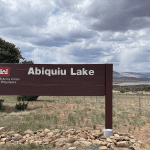- Colorado River’s management guidelines end in 2026.
- Upper Basin states emphasize planning within current water supplies.
- Leaders seek a basin-wide solution for Lake Powell and Lake Mead.
January 7, 2024 –– The Upper Colorado River Commission (UCRC) has outlined its priorities for the year , setting the stage for what could be transformative changes in how the Colorado River is managed. With current operating guidelines expiring at the end of 2026, the UCRC is urging collaborative efforts to address the basin’s enduring water challenges.
, setting the stage for what could be transformative changes in how the Colorado River is managed. With current operating guidelines expiring at the end of 2026, the UCRC is urging collaborative efforts to address the basin’s enduring water challenges.
During the recent Colorado River Water Users Association (CRWUA) conference in Las Vegas, leaders from the Upper Division states—Wyoming, New Mexico, Colorado, and Utah—highlighted the urgency of the situation. UCRC commissioners, including Brandon Gebhart (Wyoming), Estevan Lopez (New Mexico), Rebecca Mitchell (Colorado), and Gene Shawcroft (Utah), emphasized that 2025 is pivotal for reaching a consensus.
“The conversations that took place at Colorado River Water Users Association in December confirm that 2025 will be a pivotal year and critical time in the history of the Colorado River,” the commissioners stated . They stressed the need for every state to adapt to the region’s current hydrological realities, particularly in guiding operations at Lake Powell and Lake Mead.
. They stressed the need for every state to adapt to the region’s current hydrological realities, particularly in guiding operations at Lake Powell and Lake Mead.
Facing Hard Truths in the Upper Basin.
The Upper Basin states have long grappled with significant water shortages. For 24 consecutive years, these states have made uncompensated cuts to their water use, adjusting to annual shortfalls. The commissioners underscored that the Upper Basin already lives within its water means by managing rights and usage carefully.
A supply-based approach, they believe, is essential. “We must plan for the river we have, not the river we want,” the statement read , pointing to the importance of sustainable operations at Lake Powell and Lake Mead to maintain the basin-wide system.
, pointing to the importance of sustainable operations at Lake Powell and Lake Mead to maintain the basin-wide system.
Wyoming is focusing on preserving its rights through better measuring and reservoir expansion. WyoFile reports that Wyoming State Engineer Brandon Gebhart has requested $167,210 to hire hydrologists to measure water flows in the Green and Little Snake River basins. This data will help protect Wyoming’s share of the Colorado River amid climate-driven shortages and rising downstream demands. Wyoming opposes mandatory cuts and focuses on maximizing its rights through storage projects like New Fork Lake and Fontenelle Reservoir. The article states that accurate flow measurements are critical for defending the state’s water use in legal disputes and ensuring compliance with the 1922 Colorado River Compact, which mandates specific downstream water deliveries.
that Wyoming State Engineer Brandon Gebhart has requested $167,210 to hire hydrologists to measure water flows in the Green and Little Snake River basins. This data will help protect Wyoming’s share of the Colorado River amid climate-driven shortages and rising downstream demands. Wyoming opposes mandatory cuts and focuses on maximizing its rights through storage projects like New Fork Lake and Fontenelle Reservoir. The article states that accurate flow measurements are critical for defending the state’s water use in legal disputes and ensuring compliance with the 1922 Colorado River Compact, which mandates specific downstream water deliveries.
Living within the Means of the River.
With time running out, the Upper Basin is calling for open, solution-oriented discussions with all stakeholders, including Lower Basin states, tribal nations, and environmental groups. The focus is building consensus for the post-2026 operating rules while exploring innovative solutions.
The UCRC remains steadfast in its mission: “The Upper Basin has always been committed to doing the right thing for the entire Colorado River basin, and that means living within the means of the river. And now, we are more committed than ever to finding a solution that works for everyone,” they stated.
Image:
Colorado Recreational River, Colorado, Utah , by Bureau of Land Management, June 2010. Licensed under the Creative Commons Attribution 2.0 Generic license.
, by Bureau of Land Management, June 2010. Licensed under the Creative Commons Attribution 2.0 Generic license.





Leave a Reply